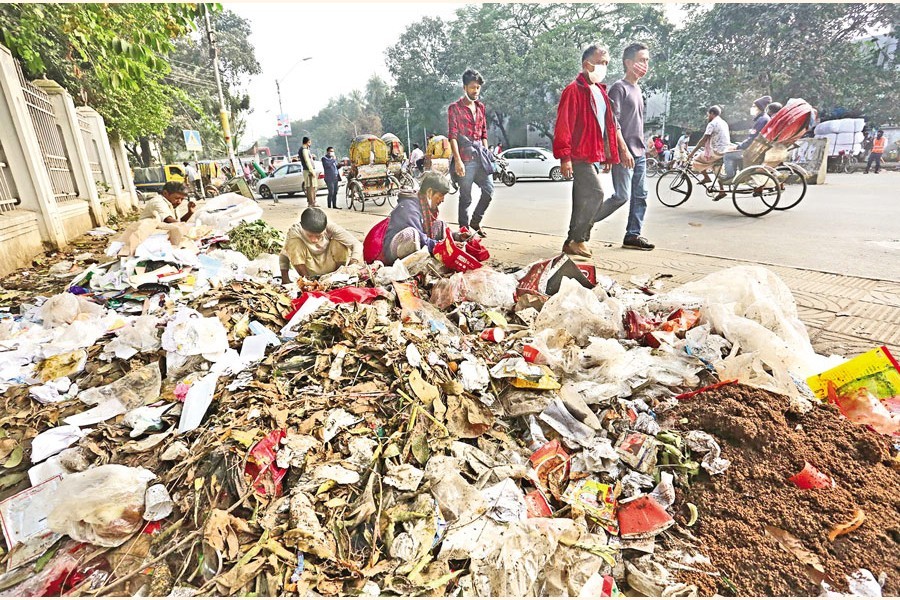
Published :
Updated :

Improper and undeveloped waste management system in the capital as well in the country is one of the major causes for the year-round mosquito infestation and mosquito-borne diseases in Bangladesh, say experts.
They suggested a central waste management system in the city as the situation will not be improved significantly until the waste management system linked to the environment is addressed accordingly.
"The is no waste management system at all in the city as well as in the country which is one of major causes for destruction of water bodies and year-round mosquito," secretary general of Environment and Social Development Organisation (ESDO) Dr. Shahriar Hossain told the FE.
"Water stagnation in any place is the main cause of breeding mosquitoes, and here is the link between the environment and the huge presence of mosquitoes in the city. Our water bodies are filled with city wastes and wastes of construction materials for decades and created an unlivable condition," he stated.
He advocated a zero waste system that declines landfill and develops a new waste management system through refuse-reduce-reuse-recycle which keeps the environment healthy and clean. "We have taken a pilot project in Lalmatia of the city to show how it works," he added.
Entomologist Dr. Kabirul Bashar, also a mosquito researcher and teacher at Jahangirnagar University, echoed the ESDO secretary general saying that undeveloped waste management is one of the main causes of the thriving mosquito, and there are some other causes too.
"Currently the city people experience a record increase in Culex mosquito population and the density of mosquito will go unabated if it cannot be addressed accordingly," he said.
"Before the emergence of the rainy season the presence of the Culex mosquito will continue," he mentioned.
Natural and sufficient flow of water in water bodies can destroy the home and breeding ground of the blood-sucking insects, he noted. "But most of the city's water bodies are occupied with huge amounts of waste meaning nothing left in the water bodies and low lands," he said.
There are three types of waste, called globally - kitchen waste, plastic and glass waste, and wastes of other materials. But Dhaka city is yet to be successful in developing a central, segregated and developed-waste management system, and the country as well," he described.
"The kitchen waste is not a problem as it is used in producing fertiliser and natural fuel (gas). Plastic, glass and other materials can be recycled and reused. We need a segregated system in collecting and managing these waste separately and monitor so that those cannot be dumped in water bodies," he narrated.
He suggested for rapid action to address the mosquito menace and control it.
Otherwise, the situation will be worse in coming years, he warned.
City dwellers, however, have a big role to play in addressing and controlling mosquito, both the experts observed, saying "We yet to raise our awareness, develop disciplines to keep our environment safe and clean."
Brig Gen Md. Zobaidur Rahman, chief health officer of Dhaka North City Corporation (DNCC) said its waste clean-up and combing and destroying mosquito breeding grounds operations are being conducted concurrently in an accelerated mode.
"Shortly after WASA handed over city canals to the city corporation authority, we started cleaning up operations and started spraying pesticide to combat mosquitoes to bring relief for the citydwells," he said.
He mentioned that Gulsha, Banani, Mirpur, TNT colony lakes which have been cleaned up while operations in other areas are also continuing. "Things happen like when we start cleaning those water bodies; huge breeding grounds get destroyed while many mosquitoes flee to residential areas. Once the operation is completed, we hope the situation will improve significantly," he described.
"We are using the fourth generation pesticide and medicine in our operation having been tested on those qualities in the best laboratory before using,'' he continued.
"With our efforts and support from all ends, we are successful in controlling Aedes mosquito in the city, and we are hopeful of controlling the Qualex mosquito to a tolerable level soon. But at the same time, the citydwellers also have responsibility to keep their city clean and safe."
Once the big landfill in Amin Bazar will come into operation we could successfully manage the city waste," he hoped.
Commodore M Saidur Rahman, chief waste management officer of the DNCC, however, said no big change is coming in the waste management system in the city soon. But plans are underway to segregate the waste management in the waste collection end, he added.
nsrafsanju@gmail.com


 For all latest news, follow The Financial Express Google News channel.
For all latest news, follow The Financial Express Google News channel.